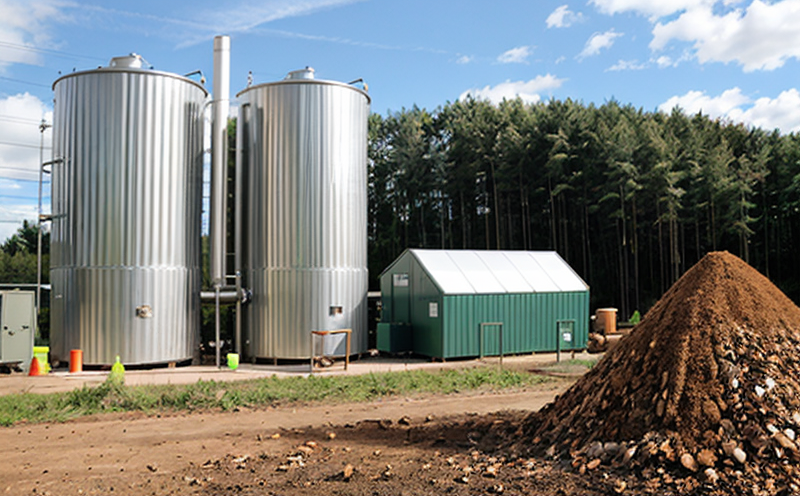ISO 23881 Greenhouse Gas Emissions from Biomass Energy Conversion
The ISO 23881 standard provides a comprehensive framework for quantifying and reporting greenhouse gas (GHG) emissions associated with the conversion of biomass into energy. This service is designed to assist quality managers, compliance officers, R&D engineers, and procurement professionals in ensuring their operations comply with international best practices.
Biomass energy conversion processes can have significant implications on environmental sustainability. Accurate quantification of GHG emissions helps organizations understand the carbon footprint of their activities and make informed decisions about process optimization. The standard establishes a methodology for calculating emissions based on lifecycle analysis, which includes all stages from feedstock production to end-of-life treatment.
Understanding the nuances of this standard is crucial for those in the waste management sector who are involved in recycling and energy conversion processes. Compliance with ISO 23881 not only ensures legal adherence but also enhances an organization's reputation as environmentally responsible stakeholders. This service aims to provide reliable, reproducible results that can be used for internal decision-making and external reporting.
Typical applications of this standard include the evaluation of different biomass feedstocks, optimization of energy conversion technologies, and assessment of carbon accounting strategies. By providing detailed emissions data, organizations can identify areas where improvements are needed to reduce their environmental impact.
The testing process under ISO 23881 involves several steps: sample collection, preparation, analysis using appropriate instrumentation, and subsequent interpretation. Sample preparation is critical as it directly affects the accuracy of emission estimates. Commonly used analytical techniques include gas chromatography for volatile organic compounds and infrared spectroscopy for carbon dioxide.
The standard specifies clear guidelines on how to account for various factors that influence emissions, such as biomass type, conversion technology, and operational conditions. These factors are crucial in ensuring consistency across different testing scenarios. Reporting requirements emphasize transparency and traceability, which allows stakeholders to verify the accuracy of reported data.
By adhering to ISO 23881, organizations not only meet regulatory requirements but also contribute positively towards sustainable development goals. This service ensures that all aspects of biomass energy conversion are thoroughly evaluated, providing robust scientific support for informed decision-making processes.
| Standard | Description |
|---|---|
| ISO 23881-1:2016 | Emission factors and calculation methods for biomass energy conversion systems (Part 1) |
| ISO 23881-2:2017 | Guidelines for lifecycle assessment of biomass energy conversion processes (Part 2) |
Applied Standards
| Standard | Description |
|---|---|
| ISO 14067:2018 | Emissions from products - Quantification and reporting of greenhouse gas emissions (General requirements) |
| ISO 50001:2018 | Energy management systems - Requirements with guidance for use |
| Standard | Description |
|---|---|
| ISO 14031:2006 | Emissions from products - Guidelines for the development, application and use of greenhouse gas inventories and registers (General requirements) |
| ISO 5725-2:2012 | Analytical methods for validation of measurement methods - Part 2: Estimation of trueness (bias) using control materials or reference standards |
Eurolab Advantages
EuroLab offers unparalleled expertise in waste management and recycling testing, leveraging advanced analytical techniques and experienced professionals to deliver accurate and reliable results. Our state-of-the-art facilities ensure that all tests are conducted under controlled conditions, adhering strictly to ISO 23881 guidelines.
We employ cutting-edge instrumentation such as Fourier Transform Infrared Spectroscopy (FTIR) and Gas Chromatography-Mass Spectrometry (GC-MS), which provide precise measurements necessary for comprehensive emission calculations. Our dedicated team of scientists ensures that each project receives personalized attention, ensuring compliance with international standards.
EuroLab’s commitment to quality is reflected in our rigorous quality assurance protocols. We maintain strict adherence to ISO 9001 certification and continually strive for excellence through continuous improvement initiatives. By choosing EuroLab, clients benefit from comprehensive support throughout the entire testing process, from initial consultation to final report delivery.
Our reputation for reliability and accuracy has earned us recognition as a trusted partner among leading companies in various sectors. Whether you need assistance with regulatory compliance or wish to enhance your product offerings through sustainability initiatives, EuroLab is equipped to meet all your needs efficiently and effectively.
Quality and Reliability Assurance
- Compliance with ISO 9001:2015 quality management system standards
- Dedicated scientists specializing in waste management and recycling
- Use of advanced analytical instrumentation for precise measurements
- Rigorous internal audits to maintain high standards of performance
- Participation in proficiency testing programs recognized internationally





